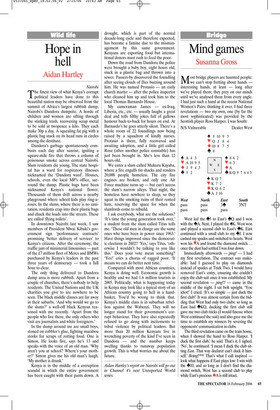Hope in hell
Aidan Hartley
Nairobi
The finest view of what Kenya’s corrupt political leaders have done to this beautiful nation may be observed from the summit of Africa’s largest rubbish dump, Nairobi’s Dandora dumpsite. A horde of children and women are sifting through the stinking trash, recovering scrap metal to be sold at twopence a kilo. They each make 30p a day. A squealing fat pig with a plastic bag stuck on its head runs in circles among the destitute.
Dandora’s garbage spontaneously combusts each day after sunrise, igniting a square-mile fire that throws a column of poisonous smoke across central Nairobi. Slum residents die young. The state hospital has a ward for respiratory illnesses nicknamed the ‘Dandora ward’. Houses, schools, even the local MP’s office, surround the dump. Plastic bags have been nicknamed Kenya’s national flower. Thousands of them drift across a nearby playground where school kids play ring-aroses. In the slums, where there is no sanitation, residents crap into their plastic bags and chuck the loads into the streets. These are called ‘flying toilets’.
In downtown Nairobi last week, I saw members of President Mwai Kibaki’s government sign ‘performance contracts’ promising ‘better delivery of services’ to Kenya’s citizens. After the ceremony, the traffic jam of ministerial limousines — part of the £7 million fleet of Mercs and BMWs purchased by Kenya’s leaders in the past three years of democracy — took a full hour to clear.
The only thing delivered to Dandora dump area is more rubbish. Apart from a couple of churches, there’s nobody to help residents. The United Nations and the UK charities you give to are nowhere to be seen. The black middle classes are far away in their suburbs. ‘And why would we go to the slums?’ a well-off black Kenyan reasoned with me recently. ‘Apart from the people who live there, the only others who visit are journalists and white foreigners.’ In the dump around me are small boys, stoned on cobbler’s glue, fighting marabou storks for scraps of rotting food. One is Simon. He looks five, says he’s 13 and speaks with the voice of an old man. ‘Why aren’t you at school? Where’s your mother?’ Simon gives me his old man’s laugh. ‘My mother is drunk.’ Kenya is in the middle of a corruption scandal in which the entire government has been caught with their pants down. A drought, which is part of the normal decade-long cycle and therefore expected, has become a famine due to the mismanagement by this same government. Kenyans are exporting food but international donors must rush to feed the poor.
Down the road from Dandora the police were brought a baby boy, eight hours old, stuck in a plastic bag and thrown into a sewer. Passers-by discovered the foundling after seeing clouds of flies buzzing around him. He was named Protasio — an early church martyr — after the police inspector who cleaned him up and took him to the local Thomas Barnardo House.
My cameraman James — ex-Iraq, Liberia, etc., etc. — usually laughs a great deal and tells filthy jokes full of gallows humour back-to-back for hours on end. At Barnardo’s he goes utterly silent. There’s a whole room of 22 foundlings now being raised by a squadron of kindly nurses. Protasio is there, fully recovered and awaiting adoption, and a little girl called Rose (after another police constable) has just been brought in. She’s less than 12 hours old.
We enter a slum called Mukuru Kayaba, where a fire engulfs tin shacks and renders 20,000 people homeless. The city fire engines are broken, and only one Air Force machine turns up — but can’t access the slum’s narrow alleys. That night, the homeless have nowhere to sleep, so they squat in the smoking ruins of their rented huts, reserving the space for when the slumlords come to rebuild.
I ask everybody, what are the solutions? ‘It’s time the young generation took over,’ a student from the slum called Titus tells me. ‘These old men in charge are the same ones who have been in power since 1963.’ Have things improved since the democratic elections in 2002? ‘Yes,’ says Titus, ‘otherwise I wouldn’t be talking to you like this.’ Does your vote mean something? ‘Yes!’ cries a chorus of ragged poor. ‘It means we can do better next time.’ Compared with most African countries, Kenya is doing well. Economic growth is healthy and we had 1.6 million tourists in 2005. Politically, what is happening today in Kenya may look like a typical story of an African country going to hell in a handbasket. You’d be wrong to think that. Kenya’s middle class is in suburban rebellion against the Wabenzi. They will no longer stand for their government’s corrupt behaviour. They have also repeatedly refused to go along with incitements to tribal violence by political leaders. But more than 20 million Kenyans live in wrenching poverty of the kind I’ve seen in Dandora — and the number keeps swelling thanks to runaway population growth. This is what worries me about the future.


















































































 Previous page
Previous page